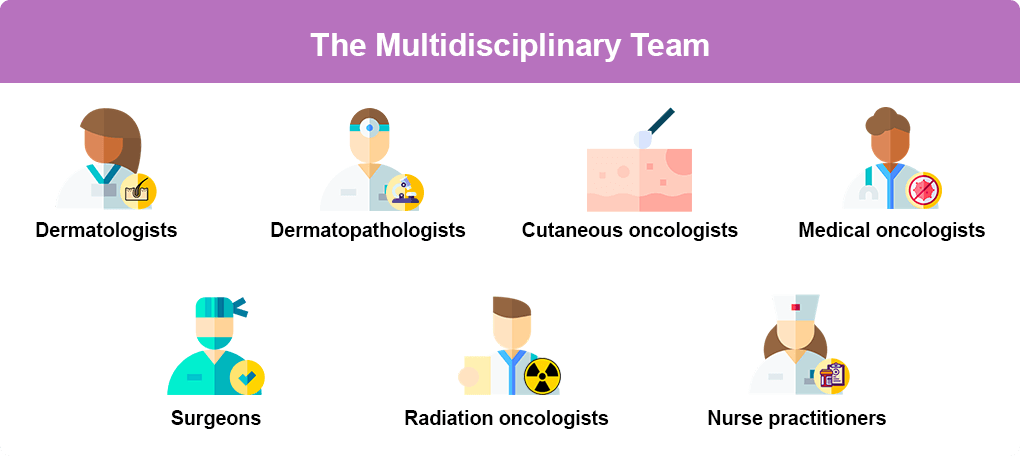Multidisciplinary Care
To effectively manage advanced basal cell carcinoma (BCC), it is important to establish strategic collaboration among a multidisciplinary team.
The multidisciplinary team can include:
Clear referral pathways and a network of specialists can streamline the management process, ensuring patients receive timely and comprehensive care based on risk assessment.1
This collaboration is particularly crucial for managing rare or high-risk BCC types that could develop into more aggressive forms. Creating networks for prompt and appropriate referrals can significantly improve patient outcomes by delivering expert oncology care.1
The Association of Community Cancer Centers outlined strategies for the timely management of non-melanoma skin cancers (NMSC) through multidisciplinary care teams. Dermatologists can assist in prompt diagnosis of advanced NMSC or high-risk cases, while the oncology team can work together to make informed treatment decisions, considering patient preferences through shared decision-making.1
The following key themes from the program should be included in daily care1:

Importance of communication within the multidisciplinary team and with dermatopathologists/pathologists to ensure reporting of high-risk features, along with enhanced patient/provider communication

Consideration of various therapeutic approaches, including immunotherapy, radiation therapy, and adjuvant therapies, as well as enrollment in clinical trials for patients with cutaneous squamous cell carcinoma

Recognition of the psychosocial impact of advanced NMSC diagnosis on patients, including the social, emotional, physical, and economic burden they may face

Identification of high-risk NMSC and patients who may be at high-risk for recurrence or relapse
A recent discussion among expert clinicians underscored the importance of collaboration within a multidisciplinary team for effective patient care. For example, dermatologists work closely with Mohs surgeons for specific cases and coordinate with medical oncologists for additional oncology expertise. This collaboration ensures that patients receive comprehensive care tailored to their needs.2
Coordination across disciplines is particularly crucial during procedures like Mohs surgery, where assessing tumor aggressiveness and discussing all treatment options helps patients understand the full scope of available care. This team-based approach also emphasizes treating the whole patient, not just the tumor. Additional support, such as social work assistance, is often provided to help manage complex needs, including effective communication and travel arrangements for patients.2
By working together, these specialists ensure that every aspect of the patient’s care is addressed, improving outcomes and overall patient experience.2
References
- Association of Cancer Care Centers. Advanced Non-Melanoma Skin Cancers – Effective Practices in Multidisciplinary Care. https://www.accc-cancer.org/home/learn/cancer-types/skin-cancer/advanced-non-melanoma-skin-cancers/advanced-nmsc-practices
- HMP Global Learning Network. Hear From the Experts: The Importance of Multidisciplinary Care in Advanced BCC and Advanced CSCC. May 22, 2024. https://www.hmpgloballearningnetwork.com/site/thederm/videos/hear-experts-importance-multidisciplinary-care-advanced-bcc-and-advanced-cscc
All URLs accessed September 12, 2025


